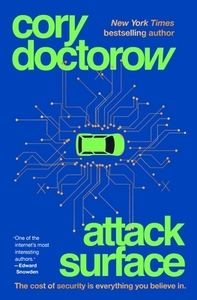Take a photo of a barcode or cover
adventurous
challenging
fast-paced
Plot or Character Driven:
Plot
Strong character development:
Complicated
Loveable characters:
Complicated
Diverse cast of characters:
Yes
Flaws of characters a main focus:
Yes
challenging
dark
hopeful
informative
fast-paced
Plot or Character Driven:
A mix
Strong character development:
Yes
Loveable characters:
No
Diverse cast of characters:
Yes
Flaws of characters a main focus:
Yes
You should read this.
adventurous
informative
tense
medium-paced
Plot or Character Driven:
Character
Strong character development:
Complicated
Loveable characters:
Complicated
Diverse cast of characters:
Yes
Flaws of characters a main focus:
Yes
challenging
dark
informative
inspiring
tense
medium-paced
Plot or Character Driven:
Character
Strong character development:
Yes
Loveable characters:
Yes
Diverse cast of characters:
No
Flaws of characters a main focus:
Yes
Everything Cory writes is worth reading. I got stuck on this one for quite some time as it was just not super engaging. The discussion of privacy, futility, politics and security was valuable and well connected, but it wasn't the same kind of engaging story as the other books in this series. Also, not that it was an intended target, I didn't feel this book was appropriate for my tween and teenage children, whereas the others absolutely were.
I had not even read the other two books in the series, but I liked this a lot.
An important book to read. As Cory writes:
“To make lasting structural changes, you need to use technology to change politics.”
and
“Technology cannot substitute for a just society, but it can help you create that society.”
This novel, although science fiction in may ways, can help us understand what the world might become if we don’t learn to use the technologies we’ve developed to create these just societies. Or, as Ron Deibert (Citizen Lab, Toronto) wrote: “Some science fiction is meant to alert us to possible worlds we may come to inhabit if we continue unreflectively on our current path of technological development.”
“To make lasting structural changes, you need to use technology to change politics.”
and
“Technology cannot substitute for a just society, but it can help you create that society.”
This novel, although science fiction in may ways, can help us understand what the world might become if we don’t learn to use the technologies we’ve developed to create these just societies. Or, as Ron Deibert (Citizen Lab, Toronto) wrote: “Some science fiction is meant to alert us to possible worlds we may come to inhabit if we continue unreflectively on our current path of technological development.”
adventurous
challenging
dark
hopeful
reflective
medium-paced
Plot or Character Driven:
Plot
Strong character development:
Complicated
Loveable characters:
Complicated
Diverse cast of characters:
Yes
Flaws of characters a main focus:
Yes
Well informed view of the challenges and opportunities that technology and communications bring, woven into a hopeful story revolving around hard ethical choices.
dark
emotional
informative
sad
medium-paced
Plot or Character Driven:
Character
Strong character development:
Complicated
Loveable characters:
No
Diverse cast of characters:
Yes
Flaws of characters a main focus:
Yes
It’s nice to see Doctorow portray someone on the other side, sort of, though he still has a massive problem with inserting long blog posts into the dialogue im the most Ayn Randian way possible.
The book was very confusing for me as an audio book in certain places when it swapped a lot between times and places, but that may just have been me not paying attention.
(I love Cory Doctorow, I should say, and I agree with him on nearly everything).
The book was very confusing for me as an audio book in certain places when it swapped a lot between times and places, but that may just have been me not paying attention.
(I love Cory Doctorow, I should say, and I agree with him on nearly everything).
Graphic: Police brutality
Moderate: Alcoholism, Drug abuse, Vomit
Synopsis: Masha Maximov works for a cybersecurity company "Xoth" which offers targeted surveillance services to governments, starting with the city of "Bltz", the capital of "Slovstakia" (obviously European Slovakia). In her free time, she helps out dissidents in Slovastakia who usually don't know how to protect their mobile phones, how easy it is to get inside and compromise the whole connected group. When autonomous cabs start hunting those dissidents, Masha understands that the firms she's working for are really bad. But it is only the start and friendly fire is hitting ever closer to her home.
Review: The dystopian, oppressive governments in this SF novel are not far away from our current situation, and everything in there could happen in a few years in our slice of reality. Doctorow's projection is absolutely relevant: BLM riots are happening right now, some of the technological surveillance techniques are used these days, and government are on the verge of falling to this fascist, rassistic, oppressive nightmare - including the U.S.A. or some EU countries.
Masha's character is only a vehicle for the author's message using first person point of view. In the second half of the novel she develops a history and emotional basis for her own. When she grew out of her super-hero status as a genius hacker girl, I grew very fond of her and loved to read her whole story. I found it enormously interesting to have a main character not on the good side but being engaged in the bad side and watching her figuring out which side she really should choose. But I had to question some of her decisions when she switched allegiances which felt unrealistic. I see the need to drive the plot forward and introduce some twists, but on the other hand it could have been less meandering and more focused, avoiding some complications.
While the novel is set in the same series as Little Brother and Homeland, I had no problems following the narration, as the dependencies seem to be sparse. I wasn't able to really connect to some side characters like Marcus who played a more important role in the previous novels, but that only means that readers who are already familiar with the setting will love it even more. The most important difference is that this novel is not YA anymore.
The plot could have been tighter, and the author needs loads of infodumps to transport his message to the reader - I was able to skip most of the explanation, because I know too much already about the inner workings of encryption or signatures for example. Casual readers might feel overwhelmed, though. But Doctorow made a fabulous job of combining those techniques and embed them in his dystopic vision. The thriller sometimes drags, but his message always works: People have to act now in order to prevent mass and targeted surveillance in our world. EU GDPR is just a start, Apple's privacy restrictions hurting Facebook and Fortnite are heavily needed everywhere.
The narration's structure jumped between several timelines quite often and sometimes I had difficulties orienting myself, leading to a somewhat stuttering reading experience. The logical connections between the timelines became obvious quite late, but I highly enjoyed it when I noticed the many interleavings.
This stuff is scary, it is relevant for the public discourse, and we need to act now. Highly recommended for fans of near future SF who don't shy back from complicated technology - not only as a fascinating reading but also as room for thought on the value of privacy and the role of governments.
Review: The dystopian, oppressive governments in this SF novel are not far away from our current situation, and everything in there could happen in a few years in our slice of reality. Doctorow's projection is absolutely relevant: BLM riots are happening right now, some of the technological surveillance techniques are used these days, and government are on the verge of falling to this fascist, rassistic, oppressive nightmare - including the U.S.A. or some EU countries.
Masha's character is only a vehicle for the author's message using first person point of view. In the second half of the novel she develops a history and emotional basis for her own. When she grew out of her super-hero status as a genius hacker girl, I grew very fond of her and loved to read her whole story. I found it enormously interesting to have a main character not on the good side but being engaged in the bad side and watching her figuring out which side she really should choose. But I had to question some of her decisions when she switched allegiances which felt unrealistic. I see the need to drive the plot forward and introduce some twists, but on the other hand it could have been less meandering and more focused, avoiding some complications.
While the novel is set in the same series as Little Brother and Homeland, I had no problems following the narration, as the dependencies seem to be sparse. I wasn't able to really connect to some side characters like Marcus who played a more important role in the previous novels, but that only means that readers who are already familiar with the setting will love it even more. The most important difference is that this novel is not YA anymore.
The plot could have been tighter, and the author needs loads of infodumps to transport his message to the reader - I was able to skip most of the explanation, because I know too much already about the inner workings of encryption or signatures for example. Casual readers might feel overwhelmed, though. But Doctorow made a fabulous job of combining those techniques and embed them in his dystopic vision. The thriller sometimes drags, but his message always works: People have to act now in order to prevent mass and targeted surveillance in our world. EU GDPR is just a start, Apple's privacy restrictions hurting Facebook and Fortnite are heavily needed everywhere.
The narration's structure jumped between several timelines quite often and sometimes I had difficulties orienting myself, leading to a somewhat stuttering reading experience. The logical connections between the timelines became obvious quite late, but I highly enjoyed it when I noticed the many interleavings.
This stuff is scary, it is relevant for the public discourse, and we need to act now. Highly recommended for fans of near future SF who don't shy back from complicated technology - not only as a fascinating reading but also as room for thought on the value of privacy and the role of governments.



